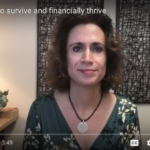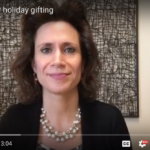 A common question I get is “what is the difference between a financial planner and a money coach?”
A common question I get is “what is the difference between a financial planner and a money coach?”
One way to think of it is that financial planners primarily focus on the future and a person’s larger asset picture (long term savings and investments). They try to help people save/invest enough to retire and reach other large goals by giving advice on how and where to invest money. They also help people manage investments during retirement. And they may also manage large portfolios if a client has trust income. These are incredibly important functions and a trusted financial planner is worth her weight in gold. I’ve referred many clients to financial planners.
A money coach, on the other hand, is involved with teaching people how to manage their current income and outgo- their cash flow. Money coaches address practical money matters as well as the emotional components that often fuel financial behaviors. Often times, my clients describe this work as their “final frontier”— while they’ve done work on many areas of their lives, money remains frustrating and confusing. Money coaches give you relief in the day to day of “dealing with money” and provide hope for the future.
For many, the key is to escape the “money fog”. The process of emerging from this fog helps clients tackle issues such as financial avoidance, emotional spending, debt, retirement funding and making more conscious decisions about their lifestyle spending. With this work, people begin to feel in control of their finances and they feel better about their money choices overall.
Some of my clients come into money coaching already working with a financial planner. However, many are distressed because while they may have an investment plan in place, they are still full of anxiety in their daily life around money. They want to use money to create a life they love in the now, as well as in the future. They don’t know how to “budget” or plan their spending. They may feel guilty about spending, sometimes struggling with credit (paying credit cards in full each month until suddenly, they can’t…) And they may feel pressure from their planner who tells them they should be investing more to “be on track”, but they really want to spend money remodeling their kitchen…
The numbers are relative. For example, in one scenario a family may make $350,000 a year in income but they spend, or suspect they spend, $400k. They hate opening up their credit card statements, and sometimes feel like they have to sell more corporate stock then they wanted to, to cover everything. They may be getting emails from their investment planners, who are worried that the investment plan is underfunded. And yet, the tuition bills continue to arrive and their friends want them to join them on expensive vacations. How to navigate all of this? This is where money coaching comes in.
Other scenarios are people who just divorced and suddenly everything is different. While a financial planner can help them feel less fearful about their future retirement, this is generally not the person to help them chart a new relationship with money. They may be working with less money, fear needing to go back to work, and /or worry about keeping a house. And if they were not the person who managed the family money during their marriage, the task of money management can feel very daunting indeed.
And in yet another scenario, perhaps someone is already retired and has a great financial planner overlooking their investments, but they need to be careful about not spending beyond their projected retirement distributions. Money coaching can help them learn how to plan their spending and live happily within their means.
One way to think of it is that money coaches are the “family doctors” of finance. Financial planners are specialists (retirement investing for example) as are CPA’s (tax advice). Money coaches:
- Help people who may struggle with overspending (spending can be very emotionally driven)
- Help people who may struggle with not earning quite enough. (Negotiating with employers can be stressful. Raising your fees for clients can feel very hard).
- Work with couples who may be in conflict with their spouse over money. (Different money styles tend to marry…)
- The list goes on.
Will a money coach talk with you about retirement? Absolutely! We cover the entire life cycle of money needs. We work with people on understanding their net worth, and we help them find the money to start, or increase their retirement investing. Financial planners love it when their clients work with a coach. When I refer a client into a financial planner, that planner knows that this person knows what they spend, and knows what they can afford to invest and has a way to stay in touch with their money when life throws them a curveball. Without this coaching work, a planner can help someone come up with a great plan for the future, only to have the person call them the next year and tap their retirement account for the kid’s braces…
A quick word on certifications. I generally recommend people look for a CFP when they want to find a financial planner or are focused on finding “retirement planning help”. This stands for Certified Financial Planner and is the gold standard of their industry. Money coaches have a variety of designations, as it is a newer field. My original certification was with the Financial Recovery Institute as a Financial Recovery Counselor and Coach. I then earned my AFC. (Accredited Financial Counselor.) I am also a member of the Financial Therapy Association. As with other things, interviewing your professionals and/ or getting good personal recommendations is hugely helpful.
With a topic as important as money, people need a good team around them. A money coaches is a key advisor. Yes, it takes a while to learn how to manage cash flow and then build a balanced lifestyle. And yes, support is invaluable when healing from financial trauma. Creating a new healthier relationship to money does not happen overnight. However, one benefit of having a coaching relationship is that after you move through the more time-intensive aspects of coaching, you can check in with your money coach for years to come on all sorts of money related topics. It feels great to have someone you can really talk to about money who truly understands you and supports your happiness- both now and in the future.





 Want some joyful inspiration for your money life? Here is an amazing podcast interview I did on how to live your financial life in alignment with your core values- so you can spend on what truly gives you JOY, while also protecting your future. This interview also looks at how to unhook your self-worth from your net worth. And then it addresses the metaphysical question of money as energy and how to feel truly abundant. Give a listen- I think you’ll be truly inspired.
Want some joyful inspiration for your money life? Here is an amazing podcast interview I did on how to live your financial life in alignment with your core values- so you can spend on what truly gives you JOY, while also protecting your future. This interview also looks at how to unhook your self-worth from your net worth. And then it addresses the metaphysical question of money as energy and how to feel truly abundant. Give a listen- I think you’ll be truly inspired.



 If you want to avoid that January spending hangover and December stress, find 15 minutes, a pad of paper and a cup of tea.
If you want to avoid that January spending hangover and December stress, find 15 minutes, a pad of paper and a cup of tea.
 saving $100 a month into a 529 plan. That’s it. Fast forward to today and we have his tuition, housing, and meal plan fully funded for over the next two years at Western Washington University ($39,000). To this we added a $5,000 GET account from his grandmother. He will have scholarship money that is the equivalent of one year’s costs. We are cash flowing the rest. Starting last month, we stopped funding the 529 and now my ex-husband and I each put $225 into a dedicated savings account. Each month. We estimate this will cover our son’s fourth year. Every family is different. I simply share it to give you one way to think about college funding.
saving $100 a month into a 529 plan. That’s it. Fast forward to today and we have his tuition, housing, and meal plan fully funded for over the next two years at Western Washington University ($39,000). To this we added a $5,000 GET account from his grandmother. He will have scholarship money that is the equivalent of one year’s costs. We are cash flowing the rest. Starting last month, we stopped funding the 529 and now my ex-husband and I each put $225 into a dedicated savings account. Each month. We estimate this will cover our son’s fourth year. Every family is different. I simply share it to give you one way to think about college funding.

 I am thinking a lot about foundations- literally. I am in the process of building a second home that I will rent out. (I’ll write future posts on alternative ways to think about retirement, income streams and going “work optional”. Once you are in command of your money, there are many ways to do it.)
I am thinking a lot about foundations- literally. I am in the process of building a second home that I will rent out. (I’ll write future posts on alternative ways to think about retirement, income streams and going “work optional”. Once you are in command of your money, there are many ways to do it.)